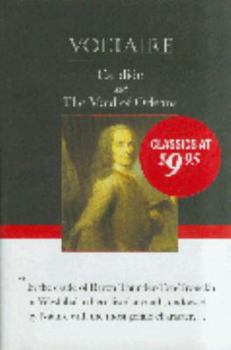Candide and The Maid of Orleans
Here are SOME of the exciting stories in this book:? Did you ever make friends with a scared raccoon? ? Did you ever see a patch-eyed pirate sneaking around the backyard? ? Did you ever hear a strange little girl talking to flowers? ? Did you ever have a pizza party in a tree-house? ? Did you ever see a young boy from a poor family writing poetry?After reading the stories, each of the rhyming poems also tells a story.? Read about the swan who saved...
Format:Hardcover
Language:English
ISBN:1587261723
ISBN13:9781587261725
Release Date:January 2004
Publisher:Borders
Weight:1.20 lbs.
Dimensions:1.3" x 5.8" x 8.8"
Customer Reviews
1 rating
Voltaire at his most sarcastic
Published by Thriftbooks.com User , 16 years ago
This was required reading for a graduate course in the Humanities. A great story and important historical work in literature. Voltaire was a Renaissance Christian humanist who played a role in the development of the Enlightenment. On the one hand, the structure of his novel Candide is Homeric, it is the journey narrative, the hero with a thousand faces, but it is a satirical restructuring of that classical motif of the hero on a quest. What is the importance of the quest in Candide? What is the quest about in the classical sense? The quest is about learning. In the classical sense the hero leaves, has to acquire some sort of knowledge, learn a set of skills that is going to help him or her enact the quest surmount the obstacles that they encounter at one point or another, and the finally what does the hero have to accomplish? What is out there the "Holy Grail" The prize, the whole quest is about attaining some sort of ultimate end or some sort of ultimate knowledge. Does it end there? No, you got to go back with that knowledge, because the quest is never just about attaining the goal, it's about bringing it home to make everybody better, to restore the community. The individual quest, the heroic quest in the classical sense always has a larger social corrective end. The purpose of the individual, the function of the individual all depends on his ability to return to the collective, whatever it is that he has found that he has acquired that is going to change the way things are. Now how does that compare to the journey or quest narrative in Candide? Contrary to the notion of what prepares us for the world, OK here is the important structure of the journey or the quest, and the critique of knowledge by Voltaire. It is contrary to the idea of the knowledge that we acquire prepares us for the world. That each new bit of knowledge that we acquire, prepares us for the next step, and prepares us for the next stage. Contrary to the idea that life is somehow to be understood or that human history is somehow to be understood as a journey organized around progress, around betterment advancement acquiring new knowledge more knowledge more science more learning, we're getting better again, Candide tells the story that goes in the opposite direction. So, then you acquire knowledge and then you spend the rest of the journey finding out that the knowledge is useless, bit by bit, and every lesson you've acquired has to be cast aside, everything you learn you have to abandon. Instead of gaining and getting better, it is throwing off, letting go, and getting worse. Where does Voltaire want us in the end to think of the notion and narrative of progress? Of course, you know that Candide is steeped in so many of the political and philosophical controversies of the 1750's. One of his big critiques is of the philosopher Leibnitz who said that `this is the best of all possible worlds," the idea championed by Leibnitz was a simple version of the





